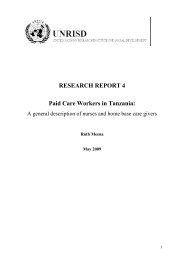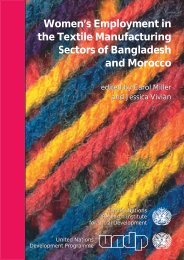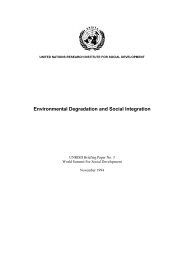Beyond Pragmatism: Appraising UN-Business Partnerships
Beyond Pragmatism: Appraising UN-Business Partnerships
Beyond Pragmatism: Appraising UN-Business Partnerships
Create successful ePaper yourself
Turn your PDF publications into a flip-book with our unique Google optimized e-Paper software.
<strong>UN</strong>RISD PROGRAMME ON MARKETS, BUSINESS AND REGULATION<br />
PAPER NUMBER 1<br />
likely focus attention on a set of crucial issues that to some extent explain the plight of many<br />
developing countries, and in which TNCs are heavily implicated. These include socially<br />
perverse patterns of deregulation and labour-market flexibilization, privatization and FDI, as<br />
well as global economic rules that are applied to countries at very different levels of<br />
development and that favour corporate interests and developed countries. They also include<br />
the gross distortions that have occurred in the distribution of income between capital and<br />
labour under corporate globalization, and the salaries of CEOs and workers. 89 Specific concerns<br />
on which more discussion is needed include speculative financial flows, transfer pricing and tax<br />
evasion, monopolizing practices and competition policy (Zammit 2003; Bendell 2004b). Many of<br />
these issues relate more to broader policy frameworks associated with neoliberalism than<br />
company policy. However, companies that claim to be proactive on the CSR front, and <strong>UN</strong><br />
institutions that promote CSR, should be concerned not only with what measures are being<br />
taken to compensate for the negative effects of certain conventional business practices, but also<br />
what, if anything, companies, and the business associations to which they belong, are doing to<br />
lobby against such macroeconomic policies. The issue of lobbying and corporate influence on<br />
public policy is a crucial one that has received only limited attention in the <strong>UN</strong> system. 90<br />
The issue has been raised by the Global Compact through recent work on “responsible<br />
lobbying” (Accountability and the Global Compact 2005). The approach adopted suggests a<br />
number of useful principles, instruments and guidelines to encourage companies to consider<br />
their lobbying practices more carefully. The problem is that an approach that centres on the<br />
firm, and on normative appeals and calls for greater consistency of lobbying practices with CSR<br />
principles and discourse, can only go so far. The key to progressive lobbying, historically and at<br />
the present, has as much, if not more, to do with the political economy context in which firms<br />
operate. Whether organized business interests support (or at least do not actively resist)<br />
progressive social and environmental policies depends crucially on the correlation of social<br />
forces and the types of pressures they encounter from other social actors; the types of<br />
compromises and bargains entered into with the state and other actors; and the strategic<br />
interests of particular industries or business groups (Evans 1997; Wilson 2003).<br />
Concerns have also arisen with regard to gender dimensions of development and human rights.<br />
The preliminary findings of a study which is examining whether the Global Compact has<br />
addressed issues of gender equality indicate that:<br />
• “[there is] no indication that gender equality or women’s equality is an important<br />
issue;<br />
• a signatory would have to look very hard to ‘learn’ about how the issue of gender<br />
inequality can be addressed, and whether it should be addressed…;<br />
• [there are] very few references or case studies that refer to women specifically;<br />
• the issue is missing from Global Compact discourse;<br />
• [one is] left with the impression that having anti-discrimination and equal<br />
opportunities policies would address the ‘women’s question’.” 91<br />
The fact that the Global Compact has not embraced critical thinking is to some extent to be<br />
expected. From a strategic point of view it would not have made sense, early on, to ask difficult<br />
questions of those it was trying to court. And the Global Compact Office was quickly forced<br />
onto the defensive by the barrage of criticism that emerged from some civil society and<br />
academic quarters regarding <strong>UN</strong> relations with TNCs. As noted above, there are concerns,<br />
89<br />
90<br />
91<br />
For a recent analysis of such aspects, see Harvey (2006).<br />
There are some important exceptions, such as the WHO report on the strategies of tobacco companies to influence public health<br />
policy (WHO 2000).<br />
These findings were presented by Maureen Kilgour at the conference, <strong>Beyond</strong> CSR? <strong>Business</strong>, Poverty and Social Justice, coorganized<br />
by the Centre for the Study of Globalisation and Regionalisation (CSGR) at Warwick University, and Middlesex University, at<br />
the National Liberal Club, London, 22 May 2006, and are reproduced here with permission from the author.<br />
40
















